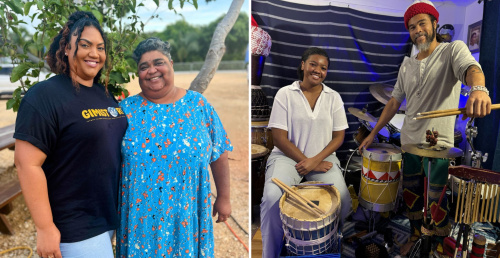One of the founding principles of the CCV is to ensure that treasured artforms from around the world not only survive but remain vibrant and essential. One of the single most effective ways to support community-based traditional arts and practices is through the support of apprenticeships. For more than two decades as a folklorist, executive director Jon Lohman has helped lead this work. In 2002, in the beginning of his tenure as Virginia State Folklorist, he launched the Virginia Folklife Apprenticeship Program, which has to this date supported more than 150 apprenticeships in a vast and diverse range of traditional arts and lifeways. In 2025, CCV took the next bold step: launching the Global Apprenticeship Program with its first international initiatives in the Cayman Islands.
Why Apprenticeships?
At its core, a cultural apprenticeship pairs a master artist with an apprentice for an immersive, one-on-one learning experience. But it’s about more than just the teaching and passing on of a particular traditional craft or skill. Apprenticeships allow learners to step inside living traditions, absorbing not only technique but the social, spiritual and environmental contexts in which these practices are rooted. Learning doesn’t happen in classrooms—it takes place in homes, kitchens, workshops, dance halls, studios and other important sites where these traditions have long been practiced and thrived. Apprentices gain a one-of-a-kind learning experience, and many go on to be lifelong practitioners, teachers themselves and ultimately masters of their chosen craft. For the participating master artists, taking on an apprentice is also a powerful opportunity to reflect on their own practice and ensure that their cultural legacy is carried forward with care.
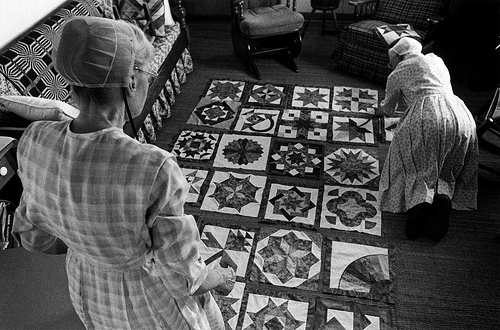
(photo by Morgan Miller)

(photo by Morgan Miller)
“Everywhere I’ve traveled—whether in small towns across Virginia or distant communities around the world—I’ve seen that traditional artforms are deeply local and rooted in community,” says Lohman. “And yet, they respond to something universal: the human urge to create beauty from ordinary things and to express, over and over again, who we are.”
Why Now?
As elders age, youth migrate and technology accelerates cultural change, the transmission of traditional knowledge becomes increasingly fragile. In some communities, only a few remaining individuals carry knowledge of specific songs, crafts, dances or rituals. Without intentional efforts to pass them on, these irreplaceable expressions of identity, memory and belonging could disappear within a generation. The Global Apprenticeship Program is CCV’s response to this urgent need—an investment in living culture powered by mentorship, relationship and deep respect.
Why the Cayman Islands?
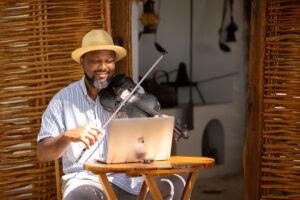
CCV’s work in the Cayman Islands began with a chance meeting between Lohman and Samuel Rose, leader and fiddler of the Cayman’s traditional musical torch-bearers the Swanky Kitchen Band, at the 2023 Galax Fiddlers Convention in southwestern Virginia. There Lohman first learned about the often overlooked Afro-Caribbean fiddling tradition and “kitchen dance” music still dedicatedly carried on by Rose and his bandmates. This chance encounter quickly developed into a growing and deeply impactful partnership, leading to several visits by Lohman to the Caymans with multi-instrumentalist and musical chameleon Danny Knicely and eventually the Swanky Kitchen Band’s inclusion in the World Culture in Context virtual cultural education program. In the summer of 2024 CCV produced Swanky’s East Coast US Tour, which included prestigious and historic performances at the Library of Congress and Lincoln Center, and marked the first time a group of traditional Caymanian musicians were ever featured at a major US folk festival.
The Cayman Islands are an especially timely and meaningful place to begin this global work. Known internationally for their beaches and booming financial sector, the islands are also home to a rich and dynamic cultural heritage shaped by African, European and Caribbean influences. But in recent decades, rapid economic development and accelerated migration to the islands have transformed the social fabric of Caymanian life. Traditional artforms, once passed down naturally through community interaction, now face increasing challenges—from diminished time for intergenerational exchange to the pressure of cultural homogenization. These shifts make intentional preservation efforts more urgent than ever.
“This is our last…”
During Lohman’s first visit to the Caymans, Lohman attended a national “Heroes Day” celebration, where the Swanky Kitchen Band were being honored for 20 years of performing and sustaining the kitchen dance tradition. Prior to the performance, Rose toured Lohman around an area of the festival dedicated to heritage crafts.
“Sam kept introducing me to various demonstrators as ‘this is our last thatcher…. This is our last net maker….’” Lohman recalls. “I knew we had a problem. When exploring ways in which CCV could assist in efforts to re-energize and reinvigorate this incredibly vital and beautiful Caymanian traditional culture, I knew that we needed to stop the bleeding, and that apprenticeships were among the most important first steps.”
By partnering with local artists and culture bearers, CCV is helping to ensure that Caymanian traditions remain vibrant and valued—not only as a source of identity for the islands’ people, but as a wellspring of creativity and meaning for the next generation.
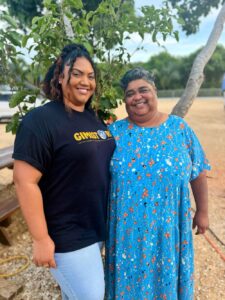
Apprenticeship Spotlight: Storytelling
Master Artist: Nasaria Suckoo Chollette
Apprentice: Priscilla Pouchie
In Caymanian culture, oral storytelling has long been a vital means of passing down history, sharing values and building community. From ghostly “duppy tales” told under the dew plum tree to stories shared among neighbors on family laundry days, storytelling has been a vital art that connected generations. Today, the number of active Caymanian storytellers has dwindled, and many familiar tales have been forgotten—but the tradition is making a powerful comeback, thanks to artists like Nasaria Suckoo Chollette.
Nasaria grew up in George Town, Grand Cayman, without television, where play came purely from imagination and books. This was where she learned to express emotions through storytelling, playacting and visual art. Nasaria studied in the US, and earned a BFA in Theater from Howard University and a MFA in Theater Education from New York University. After returning home from Howard University in the early 2000s, Nasaria joined the newly launched Gimistory Festival, a Caribbean storytelling initiative organized by the Cayman National Cultural Foundation. At the time, there were almost no Caymanian storytellers represented. “I feared my students would never hear their own accents on stage,” she recalls. So, she stepped up to tell stories herself—shifting from writing stories for the page to performing them aloud.
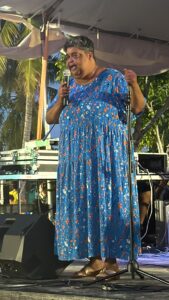
Now, as a master artist, Nasaria is mentoring Priscilla Pouchie, a promising young apprentice she met through Gimistory. Together, they are not just preserving old tales—they are discovering new ones, sometimes through song or visual art, and always with an eye toward the creative, cultural and communal power of story. “Storytelling was how we learned religion, how we learned about the world and how we entertained ourselves,” says Nasaria. “Now, young people are coming back to it. They want to know where they came from.”
With her combined skills as both a gifted storyteller and stunningly talented visual artist, CCV realized that her stories could make an incredible “crankie,” and we introduced her to the craft, ultimately sponsoring renowned crankie artist Emily Schubert to join Nasaria for a crankie-making residency in Cayman leading to Nasaria’s performance at the CCV-produced Crankies Take New York! at Flushing Town Hall in Queens, NY, last spring.

Apprenticeship Spotlight: Cayman-Style Drumming
Master Artist: Randy Chollette
Apprentice: Grace Christian Welcome
The traditional drumming style of the Cayman Islands is more than music. With its syncopated rhythms and handmade goat-skin drums, Cayman-style drumming reflects the islands’ African-Caribbean roots and creative ingenuity. It is also closely tied to the oral and performative traditions that keep Caymanian culture alive. Traditional Caymanian drumming once pulsed at the heart of community gatherings—Kitchen Dances, Sand Dances, Emancipation Day festivities—but today it is largely silent, threatened by historical suppression and modern economic shifts.
Randy Chollette is currently the only known practitioner and maker of the traditional pan drum on the islands, and he carries this legacy with reverence and urgency. For him, drumming is more than music; it is a spiritual act, a living link to his ancestors and a powerful form of cultural memory. “Drumming is attached to my heartbeat,” he says, a sentiment that speaks not only to his devotion, but to the essential place of this art form in his identity.
Born and raised in the Cayman Islands, Randy’s journey as a drummer began long before he had a proper instrument—banging out rhythms on buckets, guided by instinct and soul. His first formal drum, a handcrafted Kette drum made by a Rastafarian artisan in Trinidad, marked a turning point in 2001, launching him into a lifelong path of learning, performance, and cultural stewardship.
Though largely self-taught, Randy’s artistic development has been shaped by a few powerful moments of mentorship. Chief among them was a formative encounter with the legendary centagenarian drummer Julia Hydes, known to all on Cayman as “Aunt Julia,” one of the last living traditional Caymanian musicians of her time. From her, Randy learned not just technique—how to hold the sticks and articulate her unique playing style—but also the deep ancestral resonance behind the rhythms. Her guidance left a profound impression, reminding Randy that he was inheriting a nearly extinct tradition, one he felt a deep responsibility to carry forward.
Over the years, Randy has not only refined his playing but also delved into drum-making, deconstructing old instruments and creating new ones by hand. His work in schools—building drums and teaching students at East End Primary and Clifton Hunter High—demonstrates his belief in planting the seeds of tradition early. He also formed the Nzinga Drum Ensemble, through which he has continued to explore and promote Caymanian drumming, and in 2023 he led a beginner’s course at the National Gallery of the Cayman Islands.
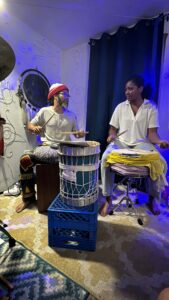
One of the more inspired students who attended one of Randy’s drumming workshops was Grace Christian Welcome, who Randy has chosen to undertake a more intensive apprenticeship to further develop and carry forward this vibrant tradition.
“Being able to learn more about the particular challenges that Aunt Julia faced as a woman playing drums back in the day—in terms of women not being encouraged to play—and now being a young Caymanian woman playing drums, is so important,” says Grace. “It’s individuals such as her that have helped open the door for someone like me to play today.” Grace’s journey reflects the deeper purpose of the Global Apprenticeship Program: not just to preserve traditions, but to empower a new generation of cultural leaders.
Looking Ahead
CCV’s work in the Cayman Islands represents just the beginning. With future apprenticeships planned in Cayman, additional apprenticeships launched in Pakistan surrounding the centuries-old sacred singing tradition of Khayal, and plans to expand into other countries, the Global Apprenticeship Program is a growing movement to sustain and celebrate cultural heritage around the world. By centering mentorship, honoring local knowledge, and investing in people, CCV is helping ensure that the world’s living traditions continue to evolve—and to inspire—for generations to come.


